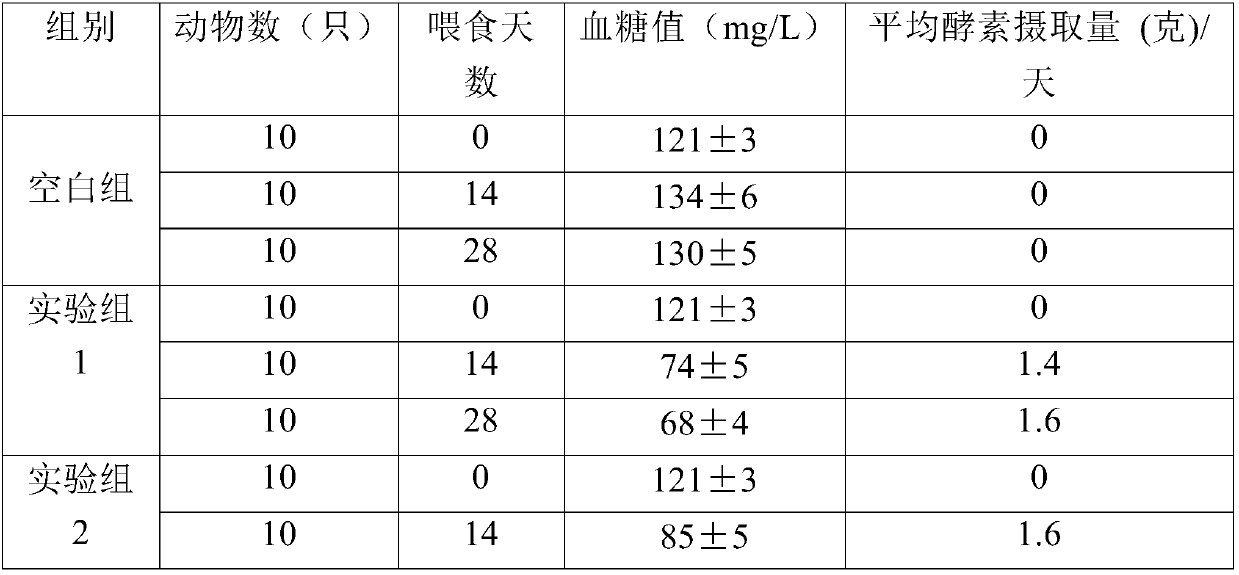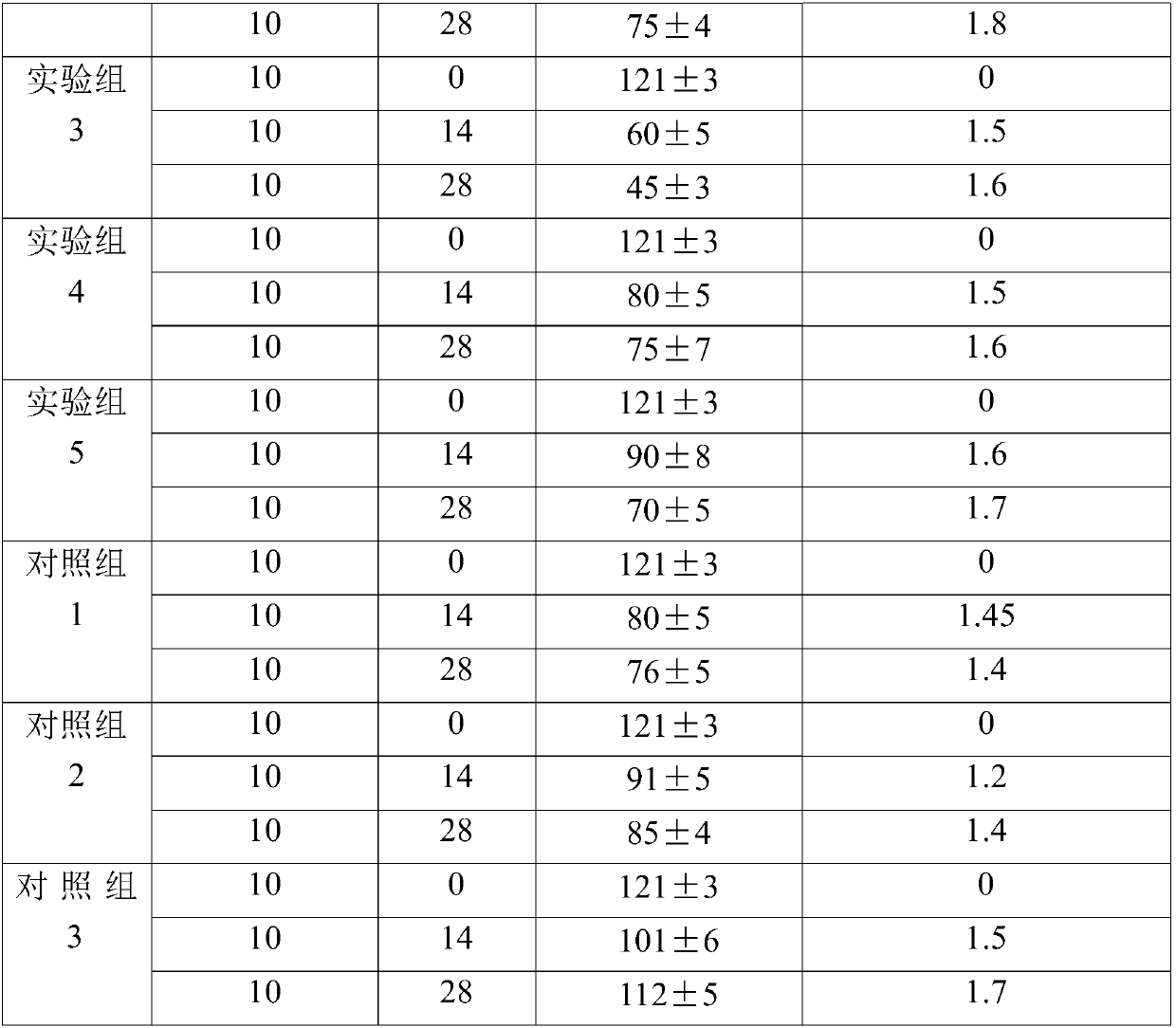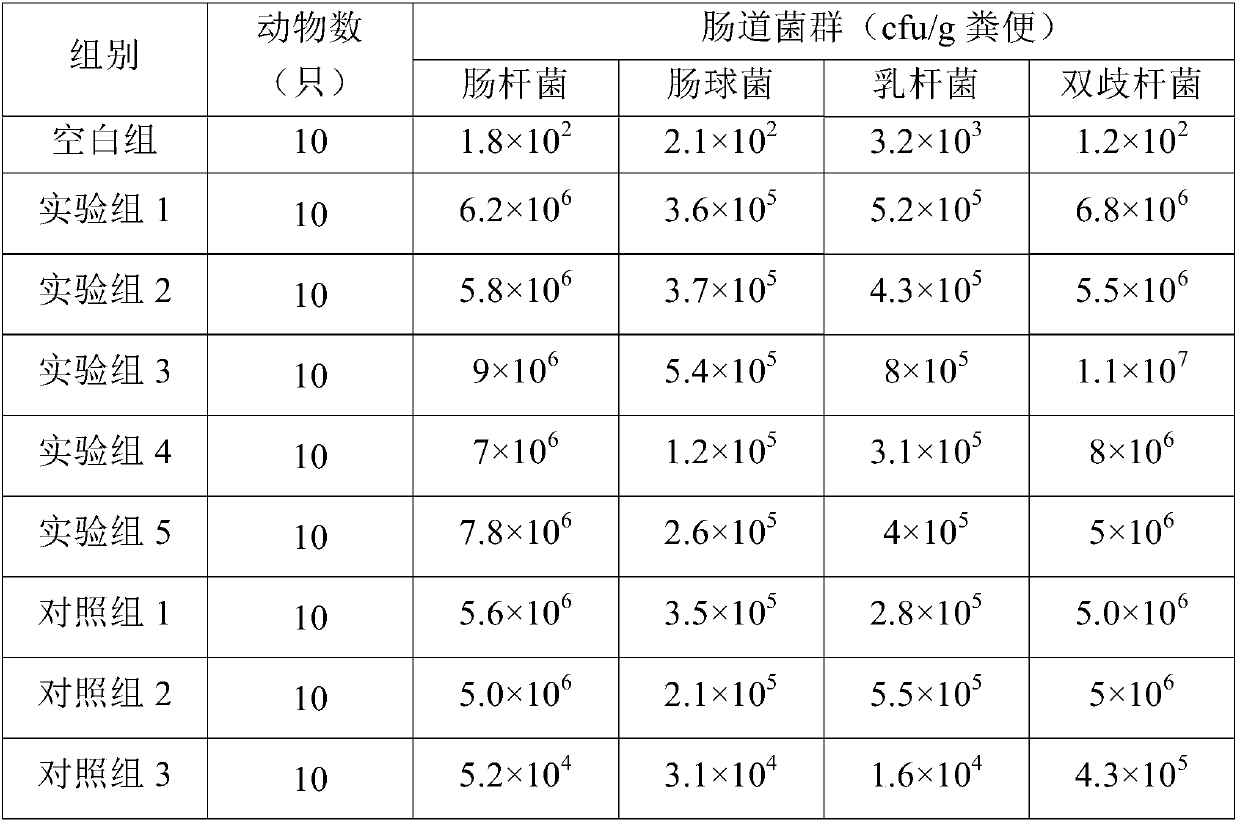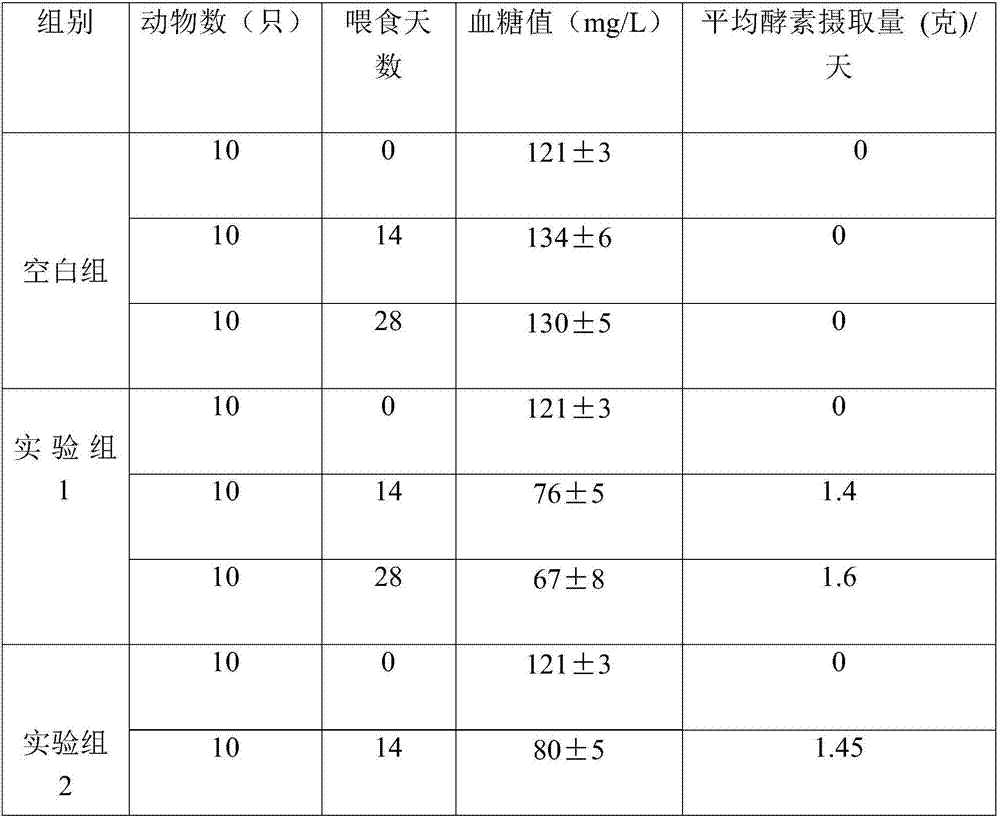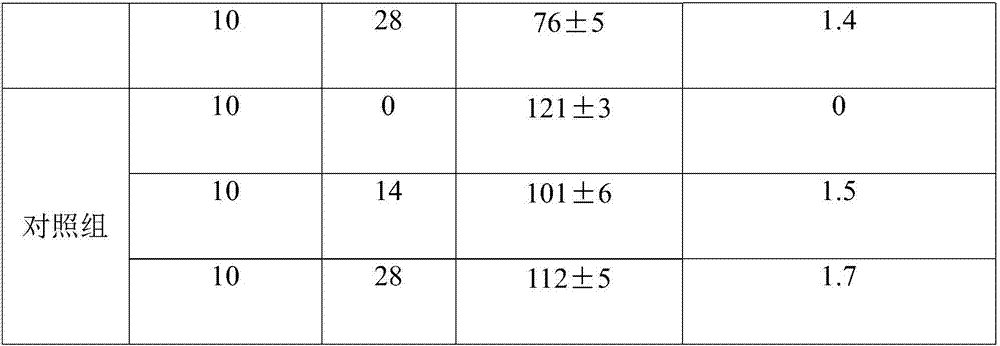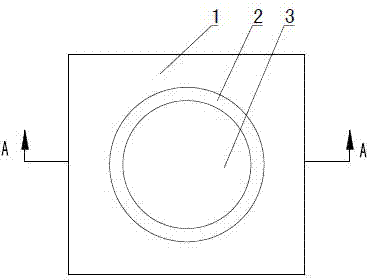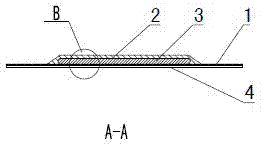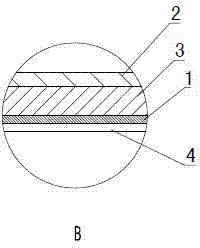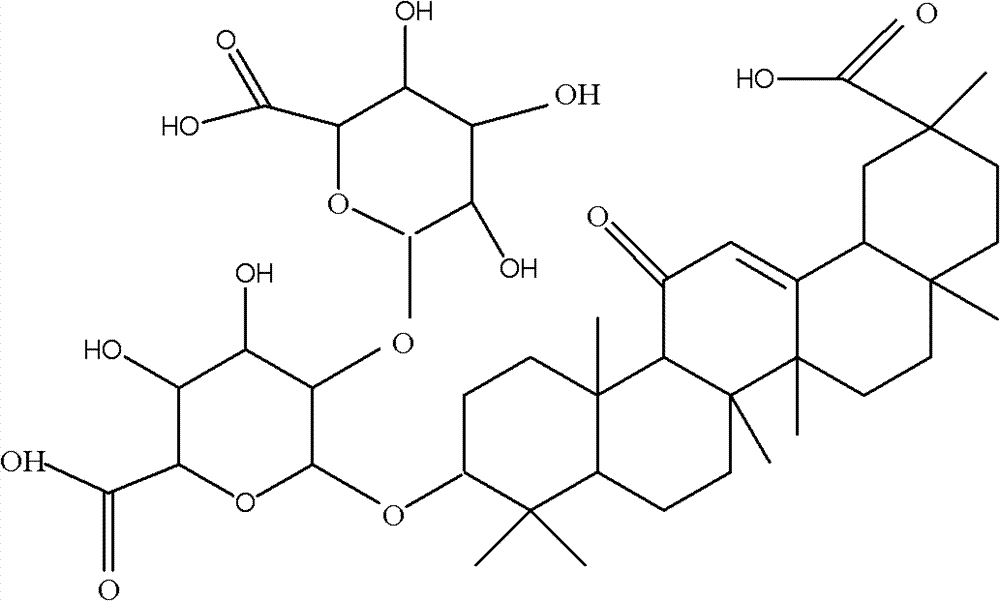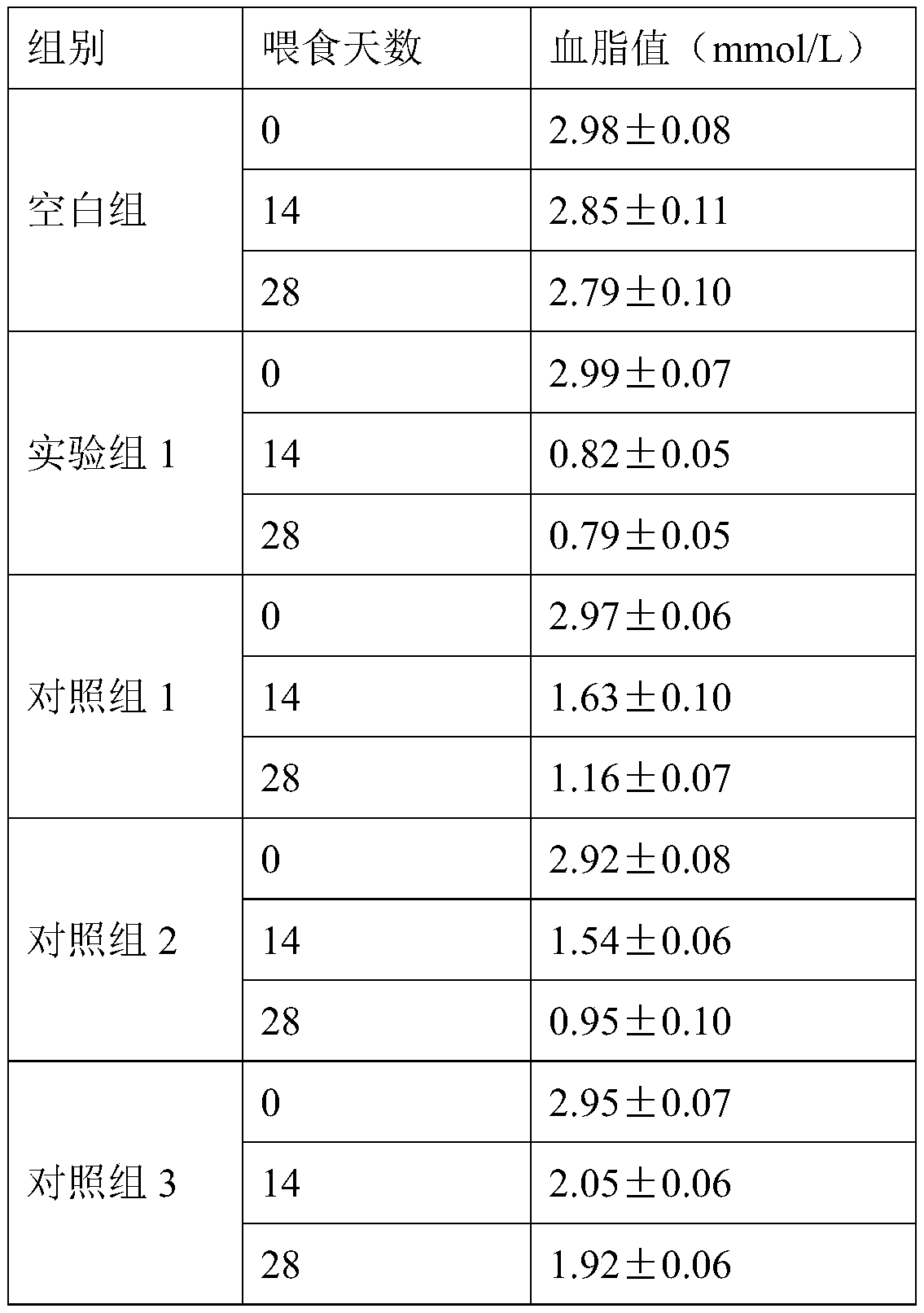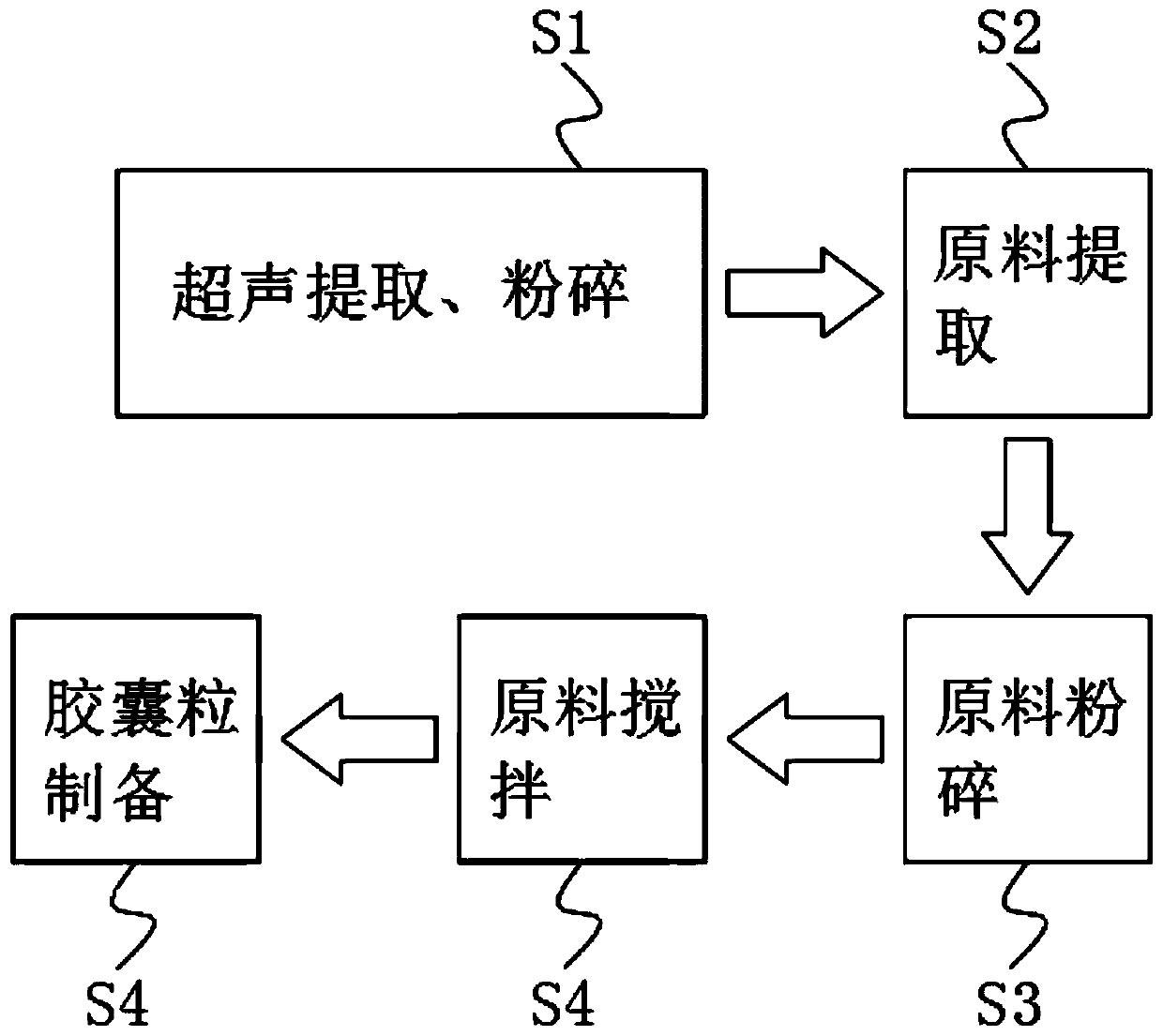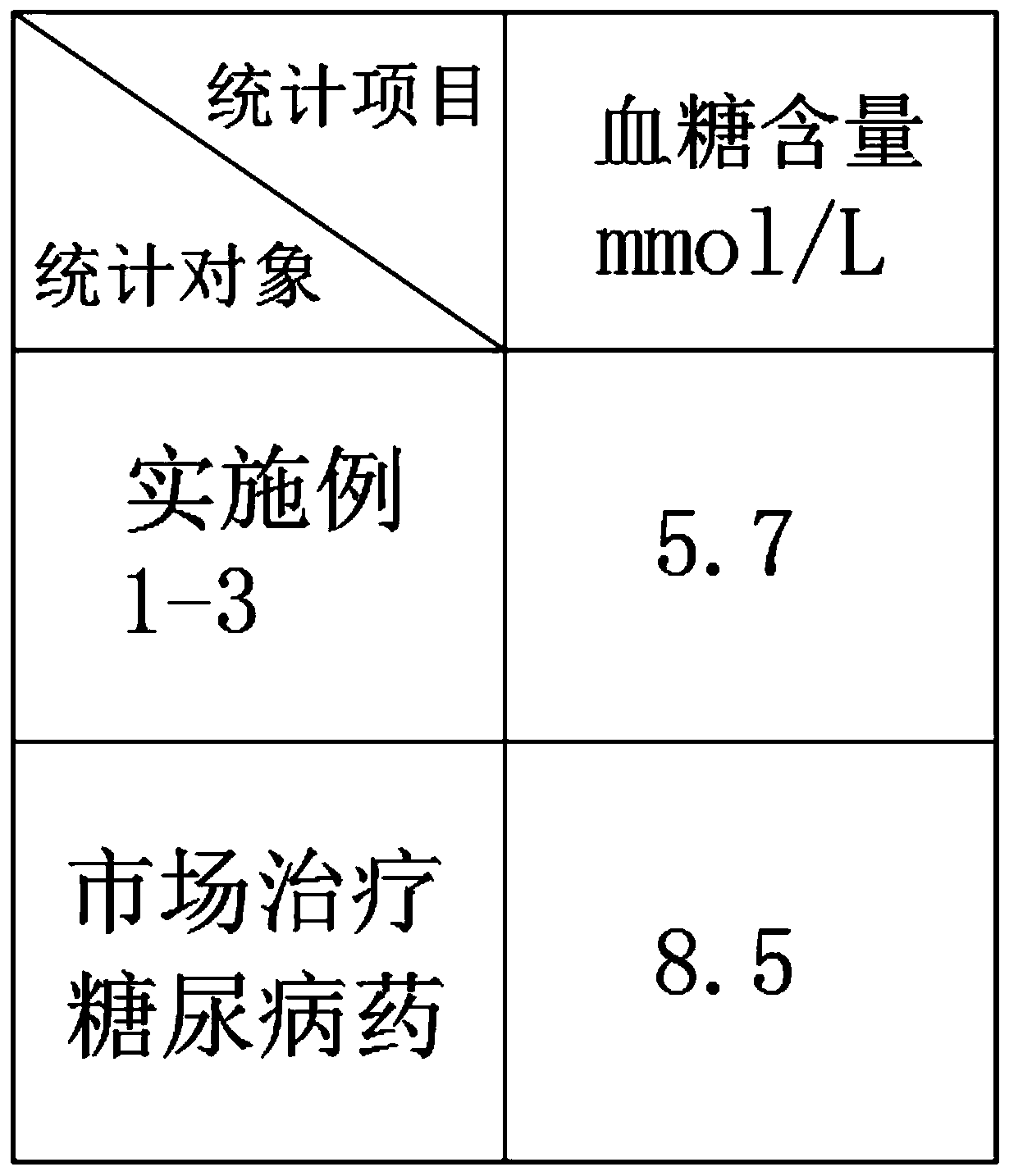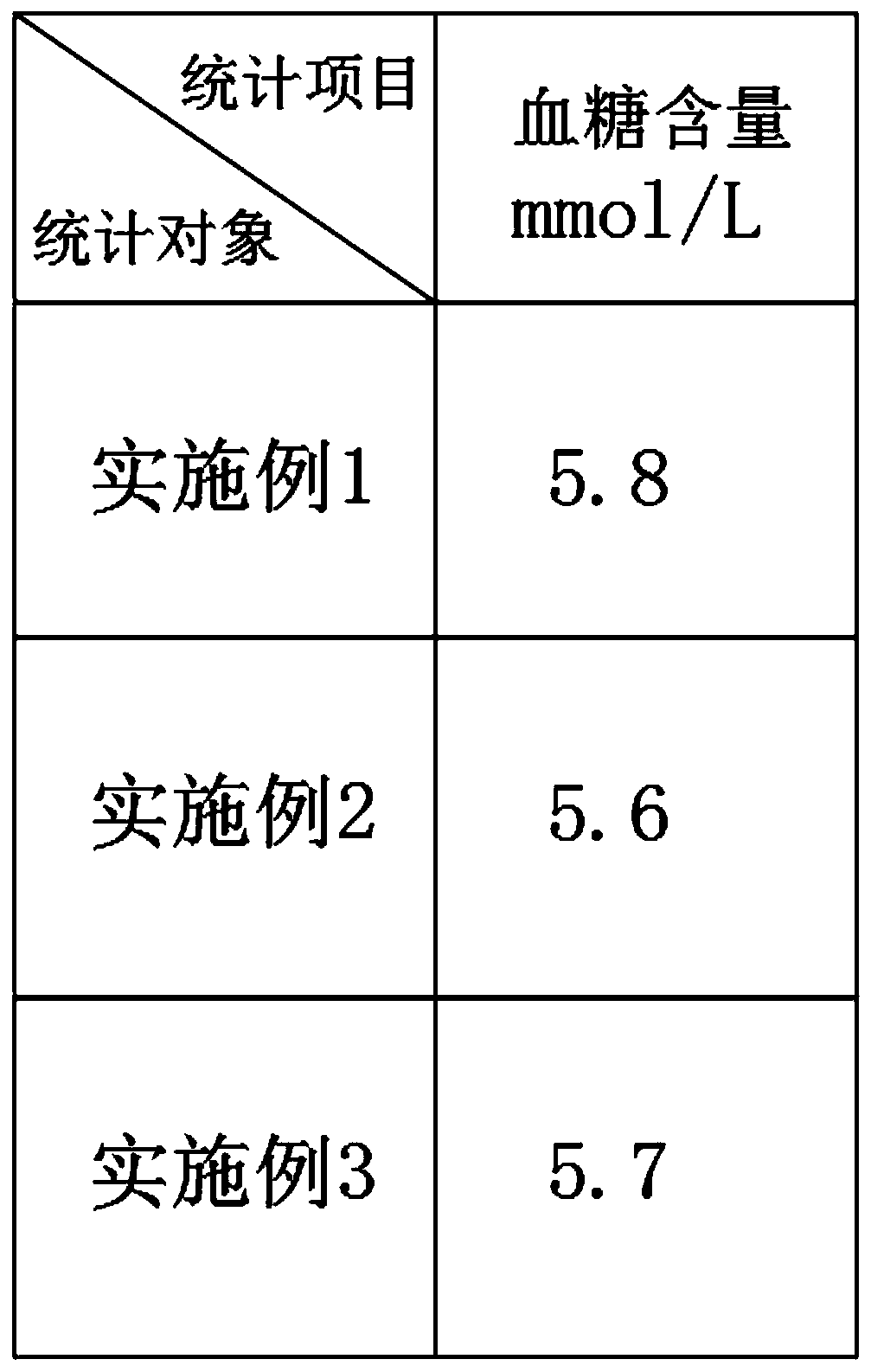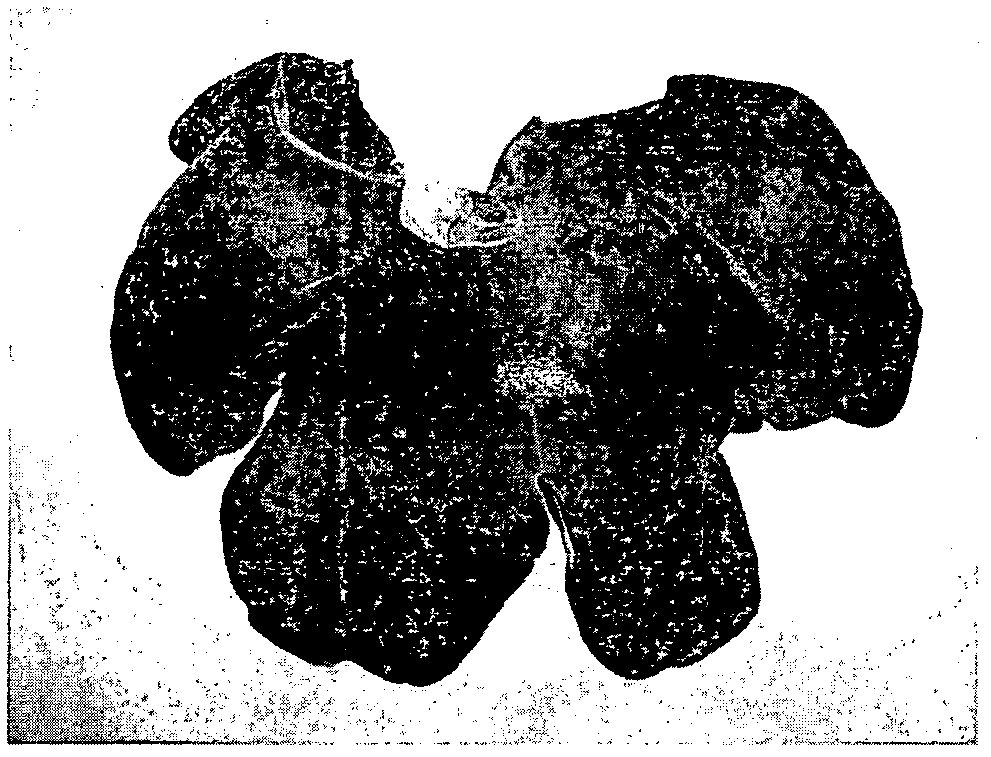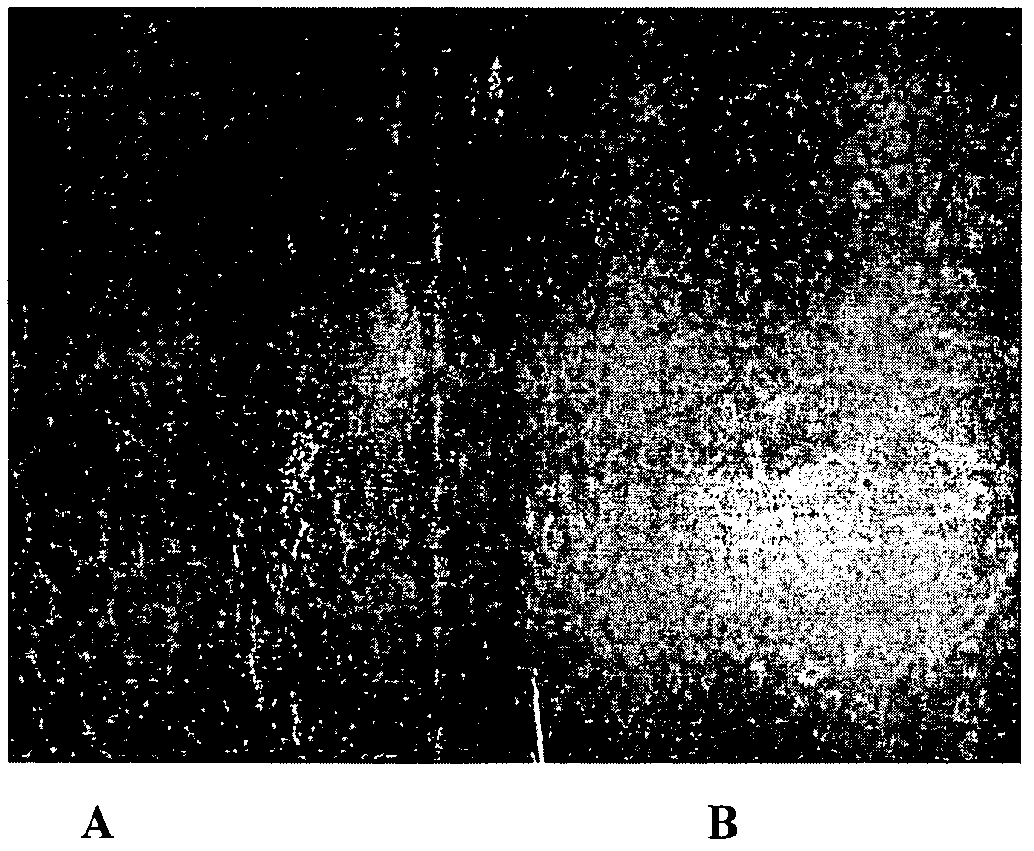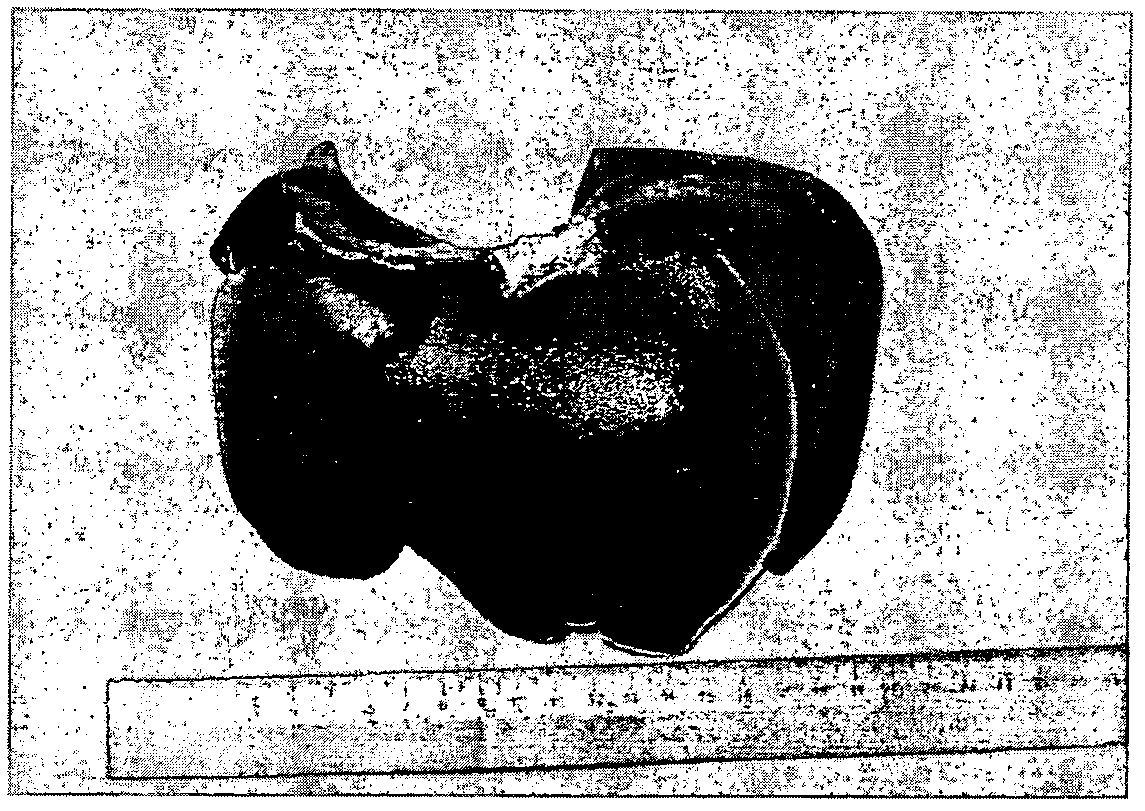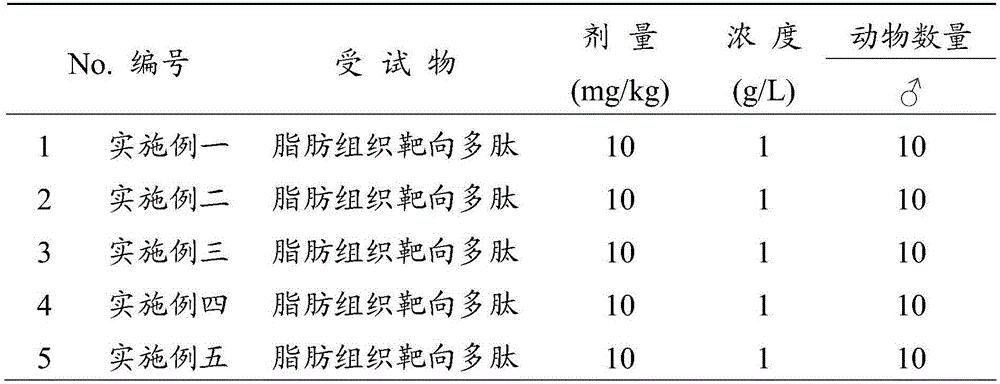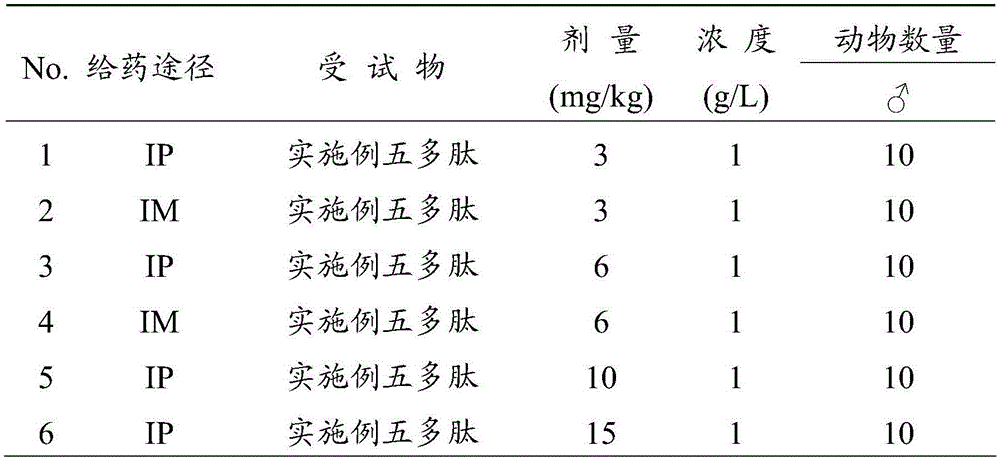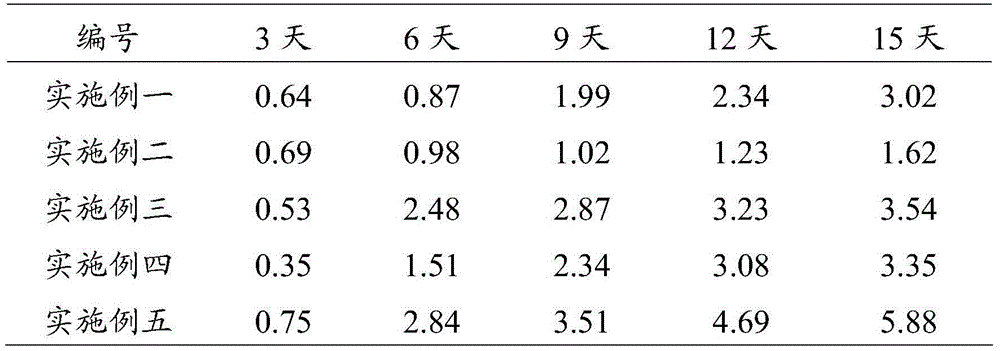Patents
Literature
Hiro is an intelligent assistant for R&D personnel, combined with Patent DNA, to facilitate innovative research.
81results about How to "Restore normal metabolism" patented technology
Efficacy Topic
Property
Owner
Technical Advancement
Application Domain
Technology Topic
Technology Field Word
Patent Country/Region
Patent Type
Patent Status
Application Year
Inventor
Whitening speckle-removing spot-removing nourishing powder
InactiveCN101129325APromote circulationEfficient removalCosmetic preparationsToilet preparationsRhizomeAstragalus Root
The invention discloses a face nourishing cream for removing leukoplakia, which is prepared from the following medicinal raw materials (by weight portion): white fungus 1-15 parts, astragalus root 1-18 parts, root of Dahurain angelica 1-20 parts, fragrant solomonseal rhizome 1-20 parts, ginseng 1-25 parts, poria cocos wolf 1-22 parts.
Owner:惠中兴
Medicinal preparation for supplementing calcium, magnesium and vitamin D
A medicine for supplementing Ca, Mg and VD to human body is proportionally prepared from Ca preparation, Mg preparation and VD.
Owner:湖南泰尔制药股份有限公司
Nursing film with whitening and compacting functions
InactiveCN106606444AAnti agingResolve slackCosmetic preparationsToilet preparationsCentella asiatica extractSide effect
The invention discloses a lady special nursing film with compacting and whitening functions, and relates to the lady special nursing film. The nursing film mainly comprises a film liquid and film paper; the film liquid comprises the following components by the mass percentage: 0.05% to 0.5% of hyaluronic acid, 0.1% to 0.5% of propylene glycol, 0.05% to 0.5% of glycerol, 0.05% to 0.5% of allantoin, 0.025% to 0.5% of methylparaben, 0.1% to 0.5% of carbomer, 0.1% to 0.5% of a pH regulator, 3.5% to 6.5% of a radix angelicae extract, 3.5% to 6.5% of a ginseng extract, 3.5% to 6.5% of a Chinese angelica extract, 3.0% to 7.0% of a hemerocallis citrina baroni and radix peucedani extract, 4.0% to 7.0% of a frankincense extract, 4.0% to 7.0% of a herba centellae extract, and the balance water. The nursing film can effectively and safely improve the skin vitality, promotes the metabolism ability of skin and synthesis of collagen, delays senility of skin cells, improves skin color, increases white and transparent effects, achieves whitening and compacting purposes, also has small toxic and side effects, has whitening and compacting dual effects, and is convenient and healthy compared with liquid type nursing products.
Owner:南京曼宝韵生物科技有限公司
Whitening, speckle removing, acne removing nutrient night-cream
InactiveCN101385695APromote circulationEfficient removalCosmetic preparationsToilet preparationsTremellaMedicine
The invention discloses a nutritious night cream for whitening and eliminating freckles and acnes, belongs to cosmetics, and in particular relates to a nutritious night cream for whitening and eliminating freckles and acnes. The nutritious night cream is made by processing the effective components extracted from the following parts of raw materials by weight: 1-15 parts of white fungus, 1-18 parts of milk vetch, 1-20 parts of dahurian angelica, 1-20 parts of dried solomonseal, 1-25 parts of white ginseng and 1-22 parts of tuckahoe. Compared with other products for whitening and eliminating freckles, the nutritious night cream has the benefits of eliminating freckles and acnes, whitening and beautifying. The product is a pure Chinese materia medica preparation, and natural, nontoxic and good for both inner tissues and skin.
Owner:惠中兴
Antidandruff and antipruritic traditional Chinese medicine composition and application and preparation method thereof
InactiveCN105168074ARestore normal metabolismBalance oil secretionCosmetic preparationsHair cosmeticsAngelica Sinensis RootCnidium monnieri
The invention discloses an antidandruff and antipruritic traditional Chinese medicine composition and its application and preparation method and belongs to the field of daily chemical articles. The traditional Chinese medicine composition comprises the following ingredients, by weight, 50-58% of an extract of artemisia argyi, 10-20% of an angelica root extract, 5-10% of an extract of angelica sinensis, 5-10% of a cnidium monnieri extract, 10-15% of a gallnut extract, 5-20% of an extract of radix sophorai flavescentis, 1-5% of an extract of Ligusticum wallichii, 5-15% of an extract of semen cuscutae and 1-10% of a desert cistanche extract. Through synergistic compounding of above ingredients, the traditional Chinese medicine composition can help balance scalp oil secretion and recover scalp metabolism, has effects of sterilizing and relieving itching, removing dandruff and controlling oil, promoting blood circulation to arrest pain, protecting hair and preventing hair loss, is safe, has no side effect, and has a function of promoting hair growth.
Owner:POMELO LEAF HK LTD
Medicine for treating diabets mellitus
InactiveCN1456338AHigh affinityImprove bindingMetabolism disorderBird material medical ingredientsSalvia miltiorrhizaDiabetes mellitus
A medicine in the form of powder, pill, tablet, or capsule for treating diabetes is prepared from 14 Chinese-medicinal materials including raw ginseng, astragalus root, coptis root, rhemannia root, etc. Its advantage is high curative effect.
Owner:夏光福
Medicine for treating burn and scald
InactiveCN1359724AMuscle strengtheningRestore normal metabolismUnknown materialsDermatological disorderCure rateCurative effect
Owner:龚礼勇
Pabular health tea electuary for preventing osteoporosis
The invention discloses a pabular health tea electuary for preventing osteoporosis, which belongs to the field of nutritious foods and has good effect and rapid effect. The pabular health tea electuary is made from the raw materials such as astragalus mongholicus, fruit of Chinese wolfberry, barley grass, whey calcium, mycose and the like, has the functions of supporting body resistance, reinforcing qi, nourishing blood, nourishing yin and strengthening bone, and has the advantages of good effect and rapid effect.
Owner:BEIJING LVYUAN QIUZHENG SCI & TECH DEV
Toilet soap formula capable of removing keratosis pilaris and preparation method thereof
InactiveCN106893651AIncrease elasticityReduce harmSoap detergents with organic compounding agentsDetergent compounding agentsHigh concentrationKeratosis Pilaris
The invention relates to a toile soap formula and a preparation method thereof, in particular to a toilet soap formula capable of removing keratosis pilaris and a preparation method thereof. The technical problem to be solved by the invention is to provide the toilet soap formula capable of removing keratosis pilaris and the preparation method thereof, wherein the toilet soap formula can repair skin, can promote cell renewing and enables the skin to recover smooth and white state. The toilet soap formula capable of removing keratosis pilaris is prepared from the following raw materials in parts by weight: 5 to 10 parts of grape seed oil, 9 to 15 parts of palm oil, 8 to 15 parts of aloe oil, 10 to 15 parts of sodium hydroxide granules, 3 to 5 parts of green tea, 15 to 20 parts of lemon essential oil, 5 to 10 parts of cinnamon leaves, 5 to 8 parts of rose essential oil, 8 to 10 parts of lemon peel, and 8 to 15 parts of alcohol. The preparation process comprises seven steps. The product prepared by the method can repair skin, can promote cell renewing, enables the skin to recover smooth and white state, contains high-concentration cutin-softening components, can promote blood circulation, effectively diminish inflammation and improve couperose skin and erythema, and can eliminate keratosis pilaris trouble.
Owner:钟浪雅
Fruit fermentation liquor capable of reducing blood sugar and preparation method of fruit fermentation liquor
InactiveCN107692219ANo dependencyRestore normal metabolismFood freezingNatural extract food ingredientsBiotechnologyPSIDIUM GUAJAVA LEAF
The invention discloses fruit fermentation liquor capable of reducing blood sugar. The fruit fermentation liquor is prepared through fermentation of the following raw materials in parts by weight: 1-5parts of probiotics fermentation liquor, 1-2 parts of banana leaves, 1-3 parts of guava fruits, 1-2 parts of guava leaves, 1-5 parts of cordyceps militaris, 1-3 parts of grape seeds, 1-2 parts of grape skin, 5-10 parts of sorbitol and 3-7 parts of dietary fibers. The probiotics fermentation liquor and natural plant extracts have synergistic reaction on reducing blood sugar. According to the prepared fruit fermentation liquor disclosed by the invention, a low-temperature extraction and freeze drying technique is combined with a probiotics fermenting technique, so that the release of effectivecomponents of the fruit fermentation liquor is increased, absorption of the effective components by intestinal tracts is promoted, and the purpose of reducing the concentration of the blood sugar is realized.
Owner:青岛国海生物制药有限公司
External-use essential oil capable of soothing body meridians
InactiveCN105520849ARestore normal metabolismImprove immunityCosmetic preparationsToilet preparationsGrape seedRosmarinus
The invention discloses external-use essential oil capable of soothing the body meridians. The external-use essential oil is prepared from the following components in percentage by weight: 45-55% of cold-pressed grape seed essential oil, 34.5-45.3% of apricot kernel essential oil, 4.95-5.05% of jojoba essential oil, 0.95-1.05% of pomegranate seed essential oil, 0.95-1.05% of rosemary essential oil, 0.95-1.05% of lavender essential oil, 0.55-0.65% of cupressus sempervirens leaf and twig essential oil, 0.45-0.55% of marjoram essential oil, 0.45-0.55% of herba pogostemonis essential oil, and 0.45-0.55% of ginger essential oil. The external-use essential oil applied to the skin has the efficacies of rapidly recovering the metabolism of the skin, dredging the channels, and relieving the symptoms, enhances the immunity of the skin, and enables the skin to recover to the healthy state.
Owner:SHENZHEN MAIGUO TECH CO LTD
Fruit fermentation liquor for reducing blood glucose and preparation method of fermentation glucose
InactiveCN107242555ANo dependencyRestore normal metabolismFood freezingNatural extract food ingredientsDietary fiberGrape seed
The invention discloses fruit fermentation liquor for reducing blood glucose. The fruit fermentation liquor is prepared from, by weight, 1-5 parts of probiotic fermentation liquor, 1-2 parts of banana leaves, 1-3 parts of guava fruits, 1-2 parts of guava leaves, 1-5 parts of cordyceps militaris, 1-3 parts of grape seeds, 1-2 parts of grape skin, 5-10 parts of sorbitol and 3-7 parts of dietary fibers. The probiotic fermentation liquor and the natural plant extracts have a synergistic effect on reducing the blood glucose. According to the fruit fermentation liquor for reducing the blood glucose, the low-temperature extraction and freeze-drying technology is combined with the probiotic fermentation technology, release of effective components of the fruit fermentation liquor is improved, absorption of the intestinal tract to the effective components is promoted, and then the concentration of the blood glucose is reduced.
Owner:青岛国海生物制药有限公司
Plant solid beverage for relieving gout and preparation method thereof
InactiveCN109090412ARaw materials are easy to getFull combinationAntipyreticAnalgesicsSide effectLobata
The invention discloses a plant solid beverage for relieving gout. The plant solid beverage for relieving gout is composed of, by weight parts, 200-250 parts of pueraria lobata, 100-150 parts of yam,and 100-150 parts of poria cocos. The raw materials sequentially undergo material taking, slicing, drying, pulverization, sieving, sterilization and packaging to obtain the plant solid beverage. Active ingredients of plants which are pure natural homology of medicine and food are extracted, which can effectively relieve symptoms of gout without causing side effects to the human body.
Owner:马玉明
Plaster for treating cervical spondylosis and lumbar spondylosis
InactiveCN104116936AEffective treatmentGood curative effectHeavy metal active ingredientsAnthropod material medical ingredientsLumbar spondylosisConnective tissue fiber
The invention discloses a plaster for treating cervical spondylosis and lumbar spondylosis and belongs to the technical field of plaster preparations. The plaster comprises a vector (1), an outer plaster (2) and an inner plaster (3), wherein the inner plaster (3) is arranged between the outer plaster (2) and the vector (1); the coating area of the outer plaster (2) is greater than that of the inner plaster (3); a coating region of an inner plaster body is positioned inside a plaster coating region of the outer plaster (2). The plaster can be used for effectively treating spondylodynia, repairing connective tissue and nerve tissue damages caused by spondylodynia and relieving spinal disease complications, and the plaster is low in allergic rate and does not mould and lose the pharmacological effect after being stored for a long period of time. According to the preparation method of the plaster, the plaster is purified by adopting an oil-soaking extraction mode or an ethyl alcohol and water mixed liquor extraction mode, and the obtained outer plaster can have the effects of preventing corrosion, inhibiting bacteria, resisting allergy and preventing the inner plaster from being aired and crushed.
Owner:陶海峰
Traditional Chinese medicine for treating gastric ulcer
InactiveCN104258262ACompatibleRestore normal metabolismDispersion deliveryDigestive systemSide effectJasminum grandiflorum
The invention relates to the field of drug formulae, in particular to a traditional Chinese medicine for treating gastric ulcer. The traditional Chinese medicine is characterized by being prepared from the following raw materials in parts by weight: 77-87 parts of oroxylum indicum, 41-51 parts of greek valerian, 25-35 parts of radix ceratostigmae, 33-43 parts of roundleaf dutchmanspipe root, 25-35 parts of semen aesculi, 18-28 parts of fingered citron, 21-31 parts of bulbiferous stonescrop, 19-29 parts of amomum cardamomum, 14-24 parts of allium macrostemon, 20-30 parts of alpinia katsumadai, 13-23 parts of adiantum, 16-26 parts of semen cuscutae, 10-20 parts of dioscorea cirrhosa, 37-47 parts of jasminum grandiflorum, 24-34 parts of polygonum orientale fruit, 26-36 parts of pterocephalus hookeri, 8-18 parts of perfoliote knotweed herb, 6-16 parts of dwarf galangal rhizome and 8-18 parts of raspberries. The raw materials are mixed, soaked with water, decocted and subjected to residue removal to obtain filter liquor. The traditional Chinese medicine has a remarkable treatment effect on epigastric pain, gastric ulcer and duodenal ulcer, can improve the gastric motility and recover normal metabolism of the stomach, is long in action time, short in treatment course, quick-acting, safe and free of toxic and side effects, and can be widely applied to clinical treatment of the gastric ulcer.
Owner:所俊强
Chinese medicine cosmetic
InactiveCN102451153APromote circulationEfficient removalCosmetic preparationsToilet preparationsPolygonum odoratumAdditive ingredient
The invention discloses a skin-whitening nourishing cream, belonging to cosmetics and more particular relating to a night nourishing cream for whitening skin and removing freckles and acnes. The skin-whitening nourishing cream is prepared by extracting effective ingredients of the following raw materials in parts by weight: 1-20 parts of white tremella fuciformis, 1-10 parts of cartialgenous, 1-20 parts of rhizoma typhonii, 1-20 parts of radix polygonati officinalis, 1-25 parts of white ginseng and 1-20 parts of tuckahoe. The skin-whitening nourishing cream disclosed by the invention has the beneficial effects of removing freckles and acnes, whitening skin and beautifying skin in comparison with other products for whitening skin and removing freckles. The product disclosed by the invention is a pure Chinese medicine preparation and is natural and nontoxic, thus both inside and outside can be given into consideration.
Owner:惠中兴
Toxin expelling and heart nourishing tea and manufacturing method thereof
InactiveCN106135556AHas the effect of invigorating QiPromote detoxificationDigestive systemTea substituesFiberDigestion
The invention discloses toxin expelling and heart nourishing tea and a manufacturing method thereof. The toxin expelling and heart nourishing tea is mainly prepared from, by weight, 5-15 parts of radix astragali, 5-8 parts of fructus lycii, 5-8 parts of longan aril, 5-10 parts of poria cocos, 8-15 parts of gorgon fruit, 5-10 parts of lotus seed, 5-10 parts of hawthorn fruit, 5-10 parts of lotus leaves, 5-10 parts of semen cassia, 5-10 parts of coix seed and 20-30 parts of strigose hydrangea juvenile leaves. By means of scientific compatibility of all raw materials, the effects supplement each other, the toxin expelling and heart nourishing tea is rich in kinds of plant fiber and has lasting fragrance, tea soup is clear and bright, soft in taste and mild in mouthfeel, the tea can effectively promote intestine and stomach toxin expelling and accelerate vivotoxin elimination, is beneficial for helping the human body to recover normal metabolism, capable of adjusting intestine and stomach functions, tonifying the spleen and kidney and promoting digestion, better in beauty maintaining and young keeping effect and suitable for masses of people groups and obesity patients with hypertension and diabetes, and the manufacturing method is simple.
Owner:黄晓萍
Fructus cannabis-semen pruni intestine smoothing and constipation relieving capsules and preparation method thereof
InactiveCN105596799ARestore normal metabolismSignificant effectDigestive systemCapsule deliveryAtractylis carduusBody fluid
The present invention discloses fructus cannabis-semen pruni intestine smoothing and constipation relieving capsules and a preparation method thereof, wherein 15-17% of fructus cannabis and 13-15% of semen pruni are adopted as the principal drug, 13-15% of polygonum cuspidatum, 15-17% of rehmannia glutinosa libosch, 6-8% of radix scrophulariae, 8-10% of winter wheat, 8-10% of citrus aurantium, 10-12% of atractylodes macrocephala, and licorice root are adopted as raw materials, and crushing, extracting and mixing are performed to prepare the intestine smoothing and constipation relieving capsules. According to the present invention, the treatment effect can achieve the symptom treatment such as intestine smoothing and constipation relieving, and the root cause treatment such as heat clearing and yin nourishing; the fructus cannabis-semen pruni intestine smoothing and constipation relieving capsules have effects of yin nourishing, heat releasing, intestine smoothing and constipation relieving, especially provides treatment effects for gastrointestinal dryness-heat and insufficient body fluid, can restore normal metabolism, fundamentally solves the problems such as dry stool, abdominal distention, dry mouth and bad breath, and can make the constipation symptom be effectively relieved and treated, and the effective rate is 100%.
Owner:刘方旭
Novel glycyrrhizic acid double salt, and preparation and application thereof
ActiveCN103242392APromote healingRecovery functionOrganic active ingredientsCosmetic preparationsPersonal careDouble salt
The invention belongs to the field of chemical raw materials, and discloses a novel glycyrrhizic acid double salt, and preparation and application thereof. The invention relates to a preparation method of a glycyrrhizic acid double salt, which comprises the following steps: dissolving glycyrrhizic acid or soluble glycyrrhetate thereof in water or a water-ethanol mixed solution, meanwhile, respectively dissolving a soluble silver salt and a soluble zinc salt in water or a water-ethanol mixed solution, and dissolving by stirring at 10-95 DEG C in a dark place; and mixing the three salt solutions to react, thereby obtaining the zinc silver glycyrrhetate white precipitate. In the invention, the glycyrrhizic acid or soluble salt thereof is combined with necessary microelement zinc for the human body and silver ions with broad-spectrum sterilizing effect for the first time; different activity action mechanisms of the glycyrrhizic acid or soluble salt thereof, zinc and silver ions are utilized to perform the functions of diminishing inflammation, killing bacteria, resisting viruses and restoring normal functions of histiocytes; and the glycyrrhizic acid double salt can be used for preparing medicines for diminishing inflammation and killing bacteria on the skin surface, or medicines for promoting restoration of mucous membranes and epithelial tissues as well as wound healing, and can also be used for preparing a washing-type personal nursing system.
Owner:NANJING HUASHI NEW MATERIAL
Plant beverage for improving microcirculation and preparation method thereof
PendingCN109820123AAvoid cell damageMaintain health and vitalityFood scienceNervous systemPharmaceutical preservatives
Owner:赛杜恳医药生物科技(上海)有限公司
Activation-for-beauty fluid and preparation method thereof
InactiveCN110711162AFacilitate carry-in absorptionImprove blood circulationCosmetic preparationsAntipyreticBiotechnologyAngelica Sinensis Root
The invention discloses activation-for-beauty fluid. The activation-for-beauty fluid comprises the following components of, by weight, the first group including 0.1% of xanthan gum, 8% to 12% of propylene glycol, 0.02% of ethylene eiamine tetraacetic acid, and 71.33% of water; the second group including 0.8% of ligusticum wallichii extract, 0.8% of angelica root extract and 2% of PEG-40 hydrogenated castor oil; the third group including 8% to 15% of Sichuan pepper pericarp extract; and 0.9% of the fourth group including water, butanediol, phellodendron amurense extract, coptidis rhizoma root extract, sophora flavescens root extract, rhus chinensis insect gall extract, fructus cnidii extract, Sichuan pepper pericarp extract and kapur; the fifth group including 0.2% of p-hydroxyacetophenone,and 1.2% of butanediol; 0.3% to 0.8% of the sixth group including glycerol caprylate, 1,3- propylene glycol and capryloyl hydroximic acid; and the seventh group including 0.1% of caramel color.
Owner:重庆创园生物科技有限公司
Medicine for treating diabetes
InactiveCN111298052AStir wellStrengthen immune defenseMetabolism disorderCapsule deliveryCoptisPancreatic hormone
The invention discloses a medicine for treating diabetes. The medicine comprises the following raw materials in percentage by weight: 11.1-15.1% of ginseng fruits, 11.1-15.1% of fragrant solomonseal rhizomes, 10.1-14.1% of kudzuvine roots, 10.1-14.1% of Chinese wolfberries, 10.1-12.1% of mulberry leaves, 9.1-13.1% of malt, 8.5-12.5% of astragalus roots, 8.5-12.5% of solomonseal rhizomes and 3.4-9.4% of coptis roots. According to the medicine for treating diabetes, through combination of the raw materials, immunity of organisms can be enhanced, virus infection can be resisted, and activity of the pancreas can be protected; normal metabolism of islet cells can be restored, and the secretion function of islet B cells can be improved; damaged islet B cells can be cultured for regeneration, insulin receptors can be enhanced, and the regulation effect of insulin can be fully exerted; trace elements closely related to diabetes can be highly supplemented; blood sugar and urine sugar can be rapidly reduced, and complications can be actively prevented and treated; and the health of diabetes patients can be comprehensively restored. The Tangshu capsule is only suitable for type II diabetes patients, is verified to have no toxic or side effects by toxicological experiments, is safe, convenient and reliable, has low dosage, is easily acceptable by patients, and has rapid and an obvious curative effect.
Owner:天津市泽陇生物科技有限公司
Healthcare underwear capable of preventing and treating diabetes
The invention discloses healthcare underwear capable of preventing and treating diabetes. An interlayer is arranged in the underwear; traditional Chinese medicine bags are arranged in positions, corresponding to one or more acupoints of a human body, of the interlayer; the acupoints include Guanyuan, Qihai, Yishu, Sanjiaoshu, Yangchi, Zusanli, Sanyinjiao, Feishu, Zhongwan, Weiyu, Mingmen, Shenshu, Zhongji and the like; medicines in the traditional Chinese medicine bags include rhizoma atractylodis, ligusticum wallichii, herba ephedra, rhizoma dioscoreae nipponicae, pinellia ternata, inula flowers, radix aconiti lateralis preparata, zanthoxylum bungeanum, fructus evodiae, fried semen pharbitidis, coptis chinensis, uncaria rhynchophylla, raw licorice root, polygonum multiflorum, radix trichosanthis, rhizoma anemarrhenae, sealwort, radix ophiopogonis, Chinese yams, Chinese wolfberries, winged euonymus twig, dogwood, cortex lycii radicis, bitter gourd, herba ephedra, potentilla discolor, angelica sinensis, ginseng, galangal, acanthopanax root, cinnamon, burdock, radix polygonati officinalis, astragalus membranaceus, cortex moutan, rhizoma alismatis, eucommia ulmoides, kudzuvine root, gynostemma pentaphylla, red peony root, loranthus parasiticus, rhodiola sachalinensis, selaginella tamariscina, ginkgo leaves, coix seeds, lychee seeds, radix rehmanniae, morinda officinalis and dendrobium officinale.
Owner:南安市荣兴专利技术转移中心有限公司
External liquid medicine for treating alopecia areata
InactiveCN107510829ATo promote metabolismPromote growthPharmaceutical delivery mechanismDermatological disorderBalsamTraditional medicine
The invention discloses an external liquid medicine for treating alopecia areata. The external liquid medicine comprises the following raw materials in parts by weight: 10 to 15 parts of soapberry, 5 to 10 pats of garden balsam, 5 to 8 parts of lucid ganoderma, 3 to 5 parts of spatholobus stem, 10 to 20 parts of biota orientalis, 15 to 20 parts of ginger, 5 to 10 parts of fleece-flower root, 3 to 5 parts of black sesame, 5 to 8 parts of rhizoma atractylodis, and 300 to 500 parts of rice wine with an alcoholic strength of 45 to 60 degrees. The preparation method comprises following steps: grinding and screening all raw materials, and then soaking raw materials in the rice wine with an alcoholic strength of 45 to 60 degrees for 30 days or more. The liquid medicine is used to treat alopecia areata, is made of pure traditional Chinese herbals, is low in toxicity, and is cheap. Moreover, the liquid medicine can prevent alopecia and promote the growth of hair, and can be directly applied to the affected parts. The effect is quick, and the treatment course is short.
Owner:GUIGANG LIGHT FAST ELECTRONICS SCI & TECH
Chinese herbal medicine-containing feed for promoting growth of goslings
InactiveCN107259180AHigh activityIncrease profitFood processingAnimal feeding stuffAnimal scienceAdditive ingredient
A Chinese herbal medicine-containing feed for promoting growth of goslings comprises, by weight, corn stalks, fish meal, soybean meal, rapeseed cakes, zeolite powder, edible salt and calcium hydrogen phosphate, and 1-2% of above materials are added to a Chinese herbal medicine formula. The purpose of the invention is to provide the Chinese herbal medicine-containing feed for promoting growth of goslings. A Chinese herbal medicine feed additive contains various bioactive substances or growth promoting factors, and promotes the growth of geese by increasing the utilization rate of nutrient substances; and a part of the additive also contains a seasoning, so the appetite of the geese is promoted, and the quality of goose meat is improved. Polysaccharides, glycosides and organic acids are main effective active ingredients in the Chinese herbal medicine feed additive, so the immune system of the gees is regulated. The Chinese herbal medicine-containing feed containing various bioactive ingredients can effectively increase the nutrition of the geese, improve the body metabolism, promote the growth of the geese and improve the muscle quality.
Owner:合肥皖高特种家禽养殖科技有限公司
Veterinary pharmaceutical composition and method (alternatives) for the prophylaxis and treatment of diseases of the gastrointestinal tract and intoxications of diverse etiology in animals
InactiveCN102655870AImprove economyRestore homeostasisOrganic active ingredientsDigestive systemEtiologyDisease
A veterinary pharmaceutical composition for treating diseases of the gastrointestinal tract and intoxications of diverse etiology in animals comprises, as the active components, hydrolyzed lignin and a prebiotic from the following group: lactulose, fructooligosaccharides, galacto-saccharides and inulin, and is in a form suitable for use in the composition of a mixture with combined feed, with a lignin content of from 30 to 95% by mass and a prebiotic content of from 5 to 50% by mass, in the form of powder or granules. The method for the prophylaxis and treatment of intoxications of diverse etiology, including mycotoxicoses, in animals, including birds, envisages that the animal will receive the above-mentioned veterinary pharmaceutical composition mixed with feed in a dosage of from 2 to 4.5 kg of the preparation per ton of combined feed, proportional to the content of mycotoxins in the combined feed. The method for the prophylaxis and treatment of diseases of the gastrointestinal tract, including dyspepsia, gastroenteritis, enteritis, colitis, hepatitis and hepato-dystrophy, including in a toxic form, in animals, including cattle and pigs, envisages that the animal will receive the veterinary pharmaceutical composition according to claim 1 30 +- 10 minutes prior to feeding, perorally individually or in a group method with water for watering or with the feed, 1 to 2 times per day in a dosage of from 0.2 to 0.3 g / kg of the mass of the animal. This ensures an increase in the effectiveness of the treatment and elimination of the above-mentioned defects in the use of hydrolyzed lignin, activated carbon and other generally known sorbents. At the same time, the joint use of lignin with a prebiotic as a means for the prophylaxis and treatment of animals makes it possible to produce a result in the form of a set of positive effects: minimization of side effects from the use of a sorbent; restoration of homeostasis in the gastrointestinal tract; and normalization of the metabolism indices, this finally resulting in a qualitative increase in the zootechnical and economic indices of animal husbandry.
Owner:亚历山大·弗拉基米罗维奇·季科夫斯基
Food health tea granule for preventing osteoporosis
The invention discloses food health tea granule for preventing osteoporosis, belongs to the nutritional food filed, and aims at achieving a good effect and becoming effective quickly. The food health tea granule for preventing osteoporosis is prepared from the materials including walnut kernel, drynaria rhizome, hawthorn leaf, cordyceps sinensis, mulberry, beer yeast cell wall and the like. The food health tea granule for preventing osteoporosis has the effects of supporting body resistance, increasing immunity, promoting blood circulation to remove blood stasis and dredging collaterals to lower blood pressure, and has the advantages of being good in effect and quick in becoming effective.
Owner:北京麦迪海药业有限责任公司
Adipose tissue targeting polypeptide, preparation method and application thereof
InactiveCN106883299AInhibit ablationAvoid Common Adverse ReactionsPolypeptide with localisation/targeting motifPeptide/protein ingredientsAdipocyte apoptosisSide effect
The invention relates to the field of protein polypeptides, and in particular relates to an adipose tissue targeting polypeptide as well as a preparation method and application thereof. The adipose tissue targeting polypeptide comprises a cell targeting polypeptide peptide fragment, a cell apoptosis polypeptide peptide fragment and a bridge chain for connecting the cell targeting polypeptide peptide fragment and the cell apoptosis polypeptide peptide fragment. The adipose tissue targeting polypeptide can specifically induce adipocyte apoptosis, so that the effect of reducing fat and losing weight is achieved. Moreover, due to the targeting action mechanism contained in the molecules, the common adverse reactions of existing weight-losing medicines can be avoided, and compared with the existing weight-reducing medicines, the adipose tissue targeting polypeptide has a more direct curative effect and less side effects.
Owner:ADLAI NORTYE BIOPHARMA CO LTD
Preparation method and application of chicken manure anaerobic fermentation high load operation regulation fungicide
The invention discloses a preparation method and application of a chicken manure anaerobic fermentation high load operation regulation fungicide. Liquid and solid compound biological preparations areprovided by aiming at a high ammonium nitrogen acidified biogas fermentation system; the high ammonium nitrogen acidified system with the gas yield being reduced or stopped can resume normal gas production; no discharging or large-scale refueling is needed; continuous and stable gas production of the biogas fermentation system can be guaranteed. In addition, the invention further provides a formula and the preparation method of the compound biological preparation aiming at resuming gas production of the high ammonium nitrogen acidified biogas fermentation system taking chicken manure as the raw material. The liquid compound biological preparation and the solid compound biological preparation can be prepared according to the method.
Owner:浙江中科筑原生态科技有限公司
Composition and preparation for regulating children's spleen, stomach, intestine and growth and development
InactiveCN109224052ARestore normal metabolismSmooth Qi stagnationHeavy metal active ingredientsHydrolysed protein ingredientsIntestinal structureVitamin C
The invention provides a composition and a preparation for regulating children's spleen, stomach, intestine and growth and development. A medicinal and edible homologous composition comprises rhizomaPolygonati, fructus crataegi, fructus Hordei Germinatus, pericarpium Citri Tangerinae, endothelium corneum Gigeriae Galli, radix Glycyrrhizae, semen lablab album, rhizoma Dioscoreae, Poria, radix Platycodonis, rhizoma Zingiberis, Coicis semen, semen Nelumbinis, fructus Amomi, casein phosphopeptide, calcium aspartate, ferrous glycine, zinc gluconate, vitamin B2, vitamin B6, vitamin D3 and vitamin C. The present invention is effective in treating various diseases caused by weakness of spleen and stomach in children, Intestinal disorder, growth retardation, etc. have good recuperation effect, avoid the harm caused by western medicine single trace element supplement, retain the advantages of traditional Chinese medicine homologous food balance homogeneous recuperation, in order to ensure the efficacy of drugs, but also avoid the damage caused to the body of their children due to excessive drug Yin and Yin Body.
Owner:湖北鼎世立华生物科技有限公司
Features
- R&D
- Intellectual Property
- Life Sciences
- Materials
- Tech Scout
Why Patsnap Eureka
- Unparalleled Data Quality
- Higher Quality Content
- 60% Fewer Hallucinations
Social media
Patsnap Eureka Blog
Learn More Browse by: Latest US Patents, China's latest patents, Technical Efficacy Thesaurus, Application Domain, Technology Topic, Popular Technical Reports.
© 2025 PatSnap. All rights reserved.Legal|Privacy policy|Modern Slavery Act Transparency Statement|Sitemap|About US| Contact US: help@patsnap.com
